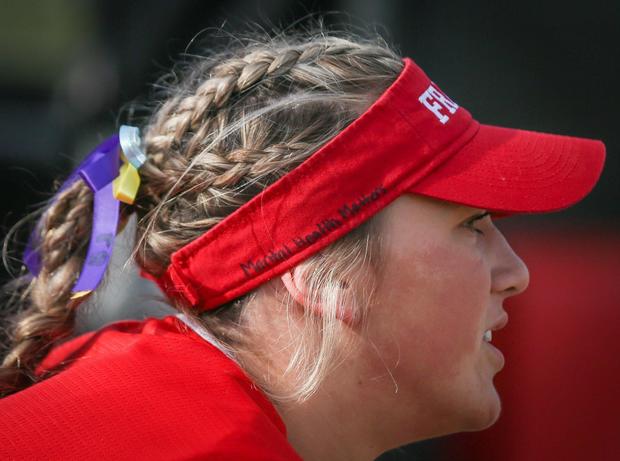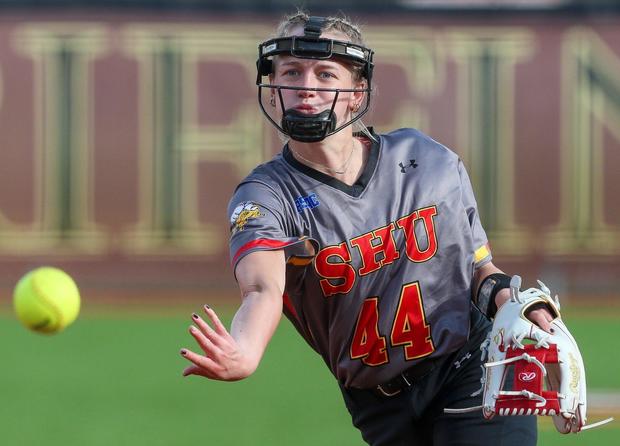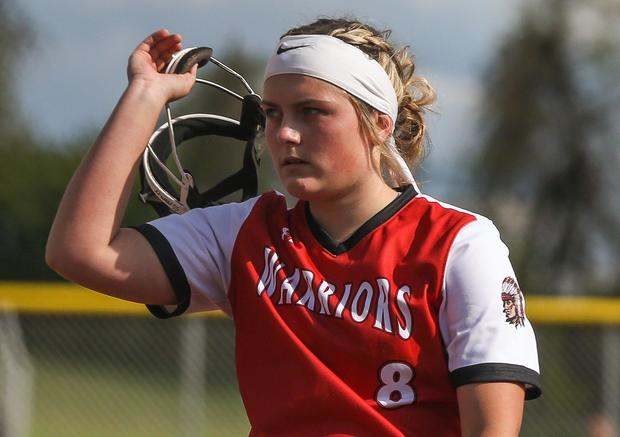Mental health and the sudden surge in suicides among NCAA women's athletes
PITTSBURGH (KDKA) — Mental health matters: That's the message that's rapidly spreading in the wake of Lauren Bernett's sudden death amid a spike in suicides among women's college athletes.
Bernett, a standout softball player at James Madison University and graduate of South Fayette High School, died last month of an apparent suicide.
Her death came just one day after she was named the player of the week for the Colonial Athletic Association. She also played a pivotal role as a freshman on the Dukes' 2021 team that made an improbable run to the College World Series.
The school announced this week that the team has canceled the rest of its season.
Her sudden death, as shocking as it was to the James Madison and the Western Pennsylvania softball communities, is unfortunately not an outlier among women's college sports.
Weeks prior, Sarah Shulze, a track star at the University of Wisconsin-Madison, took her own life.
"Balancing athletics, academics and the demands of everyday life overwhelmed her in a single, desperate moment," an announcement from Shulze's family said following her death.
In March, Katie Meyer, a team captain on the Stanford soccer team, died by suicide.
"There's so much pressure I think on athletes, right, especially at that high level balancing academics and a high competitive environment," Gina Meyer, Katie's mother, said in an interview with NBC News. "And there is anxiety and there is stress to be perfect, to be the best, to be number one."
As this recent uptick in suicides among college athletes has come to the forefront, other student-athletes have begun speaking out about the need to focus on mental health.
Cailin Bracken, a Vanderbilt lacrosse player who recently took time away from her sport to focus on her mental health, addressed these issues in an open letter to college sports.
"We have to put the person before the student and the athlete, otherwise we are at risk of losing all three," Bracken wrote.
"I needed to figure out who I was without lacrosse, and develop a sense of self — a sense of worth — outside of the sport, so that I was no longer depending on my coaches or my parents or the stat sheets to tell me I mattered," Bracken added. "If I hadn't taken this time and held this space for myself to fumble with young adulthood and with my identity, I would've resented lacrosse forever."
After taking time off from lacrosse and spending time away from the sport, Bracken is back competing and is using her story and focusing on how she can help others.
Here in the Pittsburgh area, Logan Hartman, a pitcher at Seton Hill University and a Frazier High School graduate, recently took a medical redshirt year for this season to step away from softball and focus on her mental health.
She recently spoke publicly about her struggles, writing on Instagram that she was afraid of what people would say and chose to battle the issues alone before deciding to share her story.
Hartman said that softball was always her happy place but found that this "getaway" in her life was now causing her the worst pain.
"Walking away from the game hurts bad, but I am more than an athlete," Hartman said. "For the longest time I kept this to myself and fought my own battles but I finally realized that I am not alone."
She said she hopes that the time away from the game to focus on her mental health will allow her to come back ready to compete next year.
"This has been a walk through hell but it's time to heal myself to be able to finish my final few years as an athlete," Hartman said.
All of this now begs the question: What more can be done to help student-athletes who are facing the pressures of performing in their sport along with being a student, having work priorities, and all of the other things that come with young adulthood?
Phil Larcinese, a travel softball coach here in Western Pennsylvania, said he sees all sides of these conversations, both as a coach, and as parent of a child who is an NCAA student-athlete. His daughter, Kailey, was a standout pitcher for Elizabeth Forward High School, who now attends Towson University in Maryland.
"Unfortunately, even with the best athletic environments and resources, most coaches will never know the demons their athletes are struggling with mentally until it's too late," Larcinese said.
"Good coaching is about building relationships," he added. "I have found that female athletes need to feel good mentally to perform at the highest levels. Too many coaches forget what it was like to be a kid or young adult. Our athletes need to know that they are loved and that you are invested in their success. That you, the coach, can create a competitive environment that is demanding and safe where your athletes can 'buy in' and perform without fears of failure and consequences."
Does the shift from competing at the high school level lead to an added level of pressure at the college level? Larcinese said he doesn't think so.
"Pressure on athletes will always be there, no matter if it is at the high school level or the college level," he said. "Athletics in general is about how one deals with pressure and adversity in their given sport to succeed. Athletics teaches the athlete how to succeed in life and manage their pressures.
"I believe the large shift in pressure comes from social media. Our youth are being exposed to the internet and social media at much younger ages during a vulnerable time in their mental and physical development with topics such as gender, a pandemic, politics, sexuality, social status, and suicide. Our children are dealing with information overload and the pressures to conform or fit in."
When it comes to whether the proper resources are made available to student-athletes at the college level in the area of mental health, Larcinese said he would like to think that is the case.
"Most college programs have mental health professionals on staff for each respective sport," he said. "Obviously, larger, more lucrative schools will have more staff and services."
Kristen Mackel, the Director of Mental Health and Clinical Services for the University of Pittsburgh's athletic department, said this is the case in Oakland, where the department has two full-time clinicians as well as a psychiatrist on staff.
Mackel said numerous resources are made available for student-athletes, whether they are in the form of on-site counseling, telehealth appointments, or through other various formats.
But just because those resources may be available, that doesn't necessarily mean student-athletes will take advantage of them or feel they can utilize them without jeopardizing their chances on the playing field.
While some roadblocks to resources have been eliminated, such as telehealth removing the need for in-person appointments, the stigma surrounding mental health is still the biggest hurdle in the way of supporting all those who could be looking for help.
Mackel said there is still a perception among sports that there is a need for "mental toughness," and said that this alone can be quite the roadblock when it comes to providing for those in need.
"We don't need mentally tough people, we need mentally resilient people," Mackel said.
When it comes to increasing awareness and continuing to help eliminate the stigma surrounding mental health, Mackel said the uptick in open discussion by professional athletes, the sharing of individual's own stories on social media, and the general highlighting of these topics in the mainstream media all can help shine a spotlight on mental health.
For example, five-time NBA All-Star Kevin Love has launched significant efforts to help reduce the stigma surrounding mental health by sharing his own personal struggles with depression, anxiety, and other issues.
Mackel said professional athletes sharing their stories and speaking publicly has helped younger athletes feel more comfortable when it comes to seeking help and sharing their struggles.
Larcinese said it still comes down to coaches being willing to listen to athletes when they speak and not just focus on the game.
"Unfortunately, I believe most athletes will struggle in talking freely and or speaking the truth about their mental struggles without fear of consequences with the team," Larcinese said. "This is why it is so important for coaches to create an environment where the athlete knows that they are not just another number on a line-up card."
While there may be numerous factors at play and every situation is different, being able to speak the truth about mental health and to be able to do so without fear of consequences can be the first steps toward erasing the stigma surrounding mental health and reinforcing the key message that mental health matters.
If you or someone you know is in crisis, The National Suicide Prevention Lifeline provides 24/7, free and confidential support for people in distress, prevention and crisis resources for you or your loved ones, and best practices for professionals in the United States. Call 1-800-273-8255 or click here for more information.






